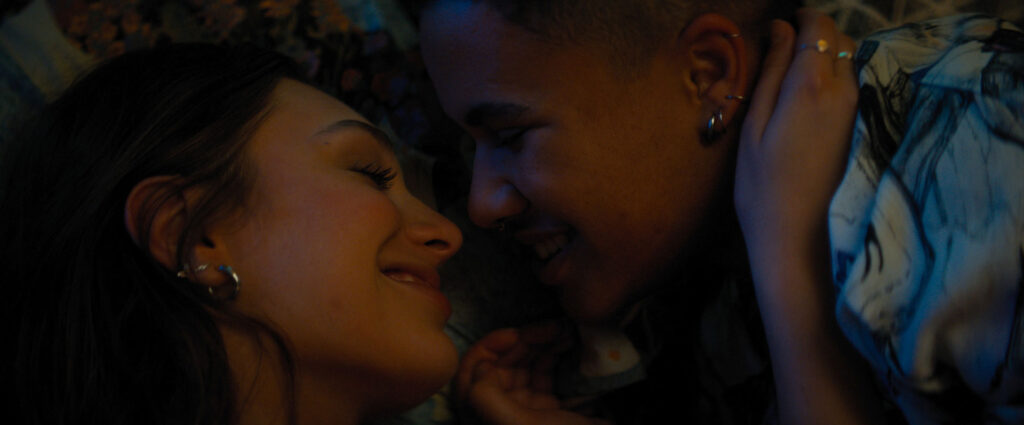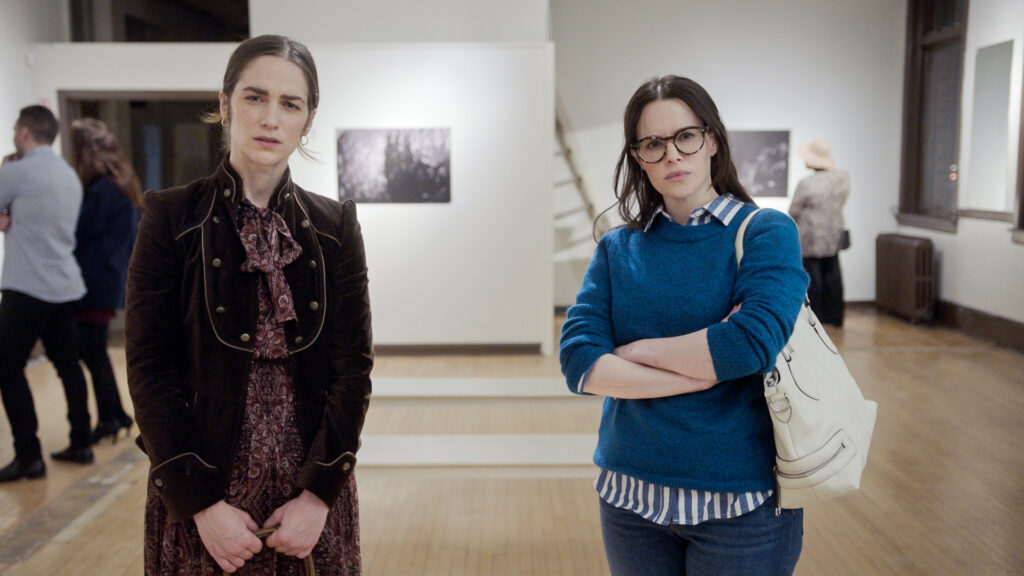February 24, 2024
by Carla Hay

Directed by Molly McGlynn
Culture Representation: Taking place in an unnamed city in Canada, the comedy/drama film “Fitting In” (which is semi-autobiographical story from writer/director Molly McGlynn) features a predominantly white cast of characters (with some African Americans and Latinos) representing the working-class and middle-class.
Culture Clash: A 16-year-old girl finds out that she has a rare gynecological condition called MRKH syndrome, where she can’t menstruate or conceive children, and she struggles with how to tell people who might be friends or intimate partners.
Culture Audience: “Fitting In” will appeal primarily to people who are fans of star Maddie Ziegler and movies that take an empathetic look at reproductive issues that are rarely depicted in movies.

The narrative of “Fitting In” occasionally wanders, but this comedy/drama has convincing performances in this coming-of-age story of a 16-year-old girl with a rare gynecological condition. It’s a unique movie with familiar views of teenage life. Because the movie’s story is based partially on the real-life experiences of “Fitting In” writer/director Molly McGlynn, “Fitting In” has a tone of authenticity that is complemented by the movie’s talented cast members.
“Fitting In” had its world premiere at the 2023 Toronto International Film Festival. McGlynn is a Canadian filmmaker. “Fitting In” takes place in an unnamed Canadian city and was actually filmed in Sudbury, Ontario. Although the movie takes place in Canada, it has situations and themes that are relatable to many cultures and the growing pains that teenagers experience.
“Fitting In” begins and ends with a scene of 16-year-old girl named Lindy (played by Maddie Ziegler) masturbating on her bed in her bedroom. By the end of the movie, she’s not quite the same person that she was in the beginning of the movie. That’s because by the end of the movie, she has already gotten the life-changing news that she has MRKH syndrome, a rare gynecological condition. Lindy has ovaries but no uterus, no cervix, and her vaginal canal is very stunted. She was born this way.
In the beginning of the movie, Lindy (who is an only child living with he divorced mother) thinks that she’s a typical teenager with typical teenage issues. She has a crush on a charismatic classmate named Adam (played by D’Pharaoh Woon-A-Tai), who is a popular athlete at their high school. Lindy, who is a virgin when the story begins, isn’t quite sure how much Adam likes her or is attracted to her, but he has definitely noticed her. In fact, when Lindy is first seen masturbating in the movie, she’s having a fantasy that she and Adam are having sex.
Lindy has a talkative best friend named Vivian (played by Djouliet Amara), who is gossipy about what other students are doing in their love lives. One day, Lindy and Vivian are talking about Adam and his most recent ex-girlfriend, who is another student named Karina. Lindy wonders out loud if Adam and Karina had sex when they were a couple. Vivian days that Adam and Karnina most likely had sex and Karina “does anal.”
Vivian and Lindy are both rising-star athletes on their school’s track team. Lindy has a harmless crush on their track coach, whose name is Coach Mike (played by Dennis Andres), a tattooed guy in his 30s. Lindy’s identity at school is wrapped up in being on the track team, but her outlook on life and who she is will change after she finds out that she has MRKH syndrome
Lindy hasn’t begun menstruating yet, but she thinks it’s because she’s late bloomer. She’s still embarrassed about not getting her menstrual period when it seems like all of her teenage girl peers have already developed in this way. Lindy pretends to Vivian and anyone else who might notice that Lindy has a menstrual cycle.
Lindy and Vivian happen to be in a drugstore together when they meet a classmate named Jax (played by Ki Griffin), who identifies as non-binary and uses the pronouns “they” and “them.” Jax is androgynous-looking and happens to be intersex, which means that Jax was born with male and female genital characteristics. Over time, Lindy and Jax get to know each other better. The movies shows whether or not Lindy and Jax confide in each other about their unusual biological conditions.
Meanwhile, a large part of “Fitting In” is about the sometimes-tense relationship between Lindy and her mother Rita (played by Emily Hampshire), a therapist who works from home and often does sessions with her clients through online videoconferencing. When Lindy and Rita argue, it’s usually because Lindy thinks Rita is being too meddling, while Rita thinks Lindy is being too standoffish with Rita. Lindy’s father abandoned Rita and Lindy when Lindy was very young, and he is no longer in their lives. Rita is neurotic and insecure about a lot of things: dating as a single mother, being rejected, and dealing with past trauma from her childhood.
Rita mentions that her own mother was difficult and “crazy,” which is why Rita tries so hard to have a good relationship with Lindy. Rita is in a situation that many mothers of teenage girls experience: As the teenage daughter approaches adulthood, the mother wants to have a balance of being an authoritative parent and being an understanding friend. It’s a balance that is often uneasy and often comes with misunderstandings and conflicts, as the teenage daughter wants more independence from a parent.
When Lindy tells Rita that Lindy still hasn’t developed a menstrual cycle, Rita immediately arranges for Lindy to go to a gynecologist named Dr. Aranda (played by Rhoslynne Bugay), who is professional and informative. Lindy and Rita find out at the same time in the doctor’s office that Lindy has MRKH syndrome. Rita bursts into tears. Lindy is in shock and is initially confused, until the knowledge starts to sink in that Lindy can never get pregnant or give birth.
“Fitting In” shows the fluidity of Lindy’s dating experiences, as three people end up getting sexually close to Lindy in various ways: Adam; a mild-mannered, fast-food worker named Chad (played by Dale Whibley); and Jax. “Fitting In” is mostly about Lindy’s journey in the weeks after she finds out about having MRKH syndrome. She goes through a myriad of emotions that Ziegler expresses realisitically. The supporting cast members, especially Hampshire, Woon-A-Tai and Griffin also handle their roles with aplomb.
Aside from issues about her reproductive health, Lindy’s diagnosis MRKH syndrome also affects her sexual health. She is given medical dildos by a nurse named Lisa (played by Emma Hunter), who tells Lindy that it will take about three to 18 months of using these dildos to create a vaginal opening that looks “normal.” Lisa tactlessly tells Lindy about using these dildos to make Lindy’s vagina bigger: “You’re an athlete, right? Think of it like training or vagina boot camp.” Lindy also has visits with another gynecologist named Dr. Doheny (played by Michael Therriault), who is less compassionate than Lisa.
“Fitting In” has typical scenes of teenage parties, where some of the drama happens in Lindy’s love life. She also has an awkward experience when her gynecologist recommends that she go to a support-group meeting for people who identify as LGBTQIA2S+ (lesbian, gay, bisexual, transgender, queer/questioning, intersex, asexual, or two-spirit), where Jax is a regular attendee. Lindy grapples with shame, defiance, anger and acceptance about her condition. Ultimately, “Fitting In” tells a sometimes-serious, sometimes-amusing story that allows viewers to think about how much or if reproductive organs should define the essence of who people are.
Blue Fox Entertainment released “Fitting In” in select U.S. cinemas on February 2, 2024.


